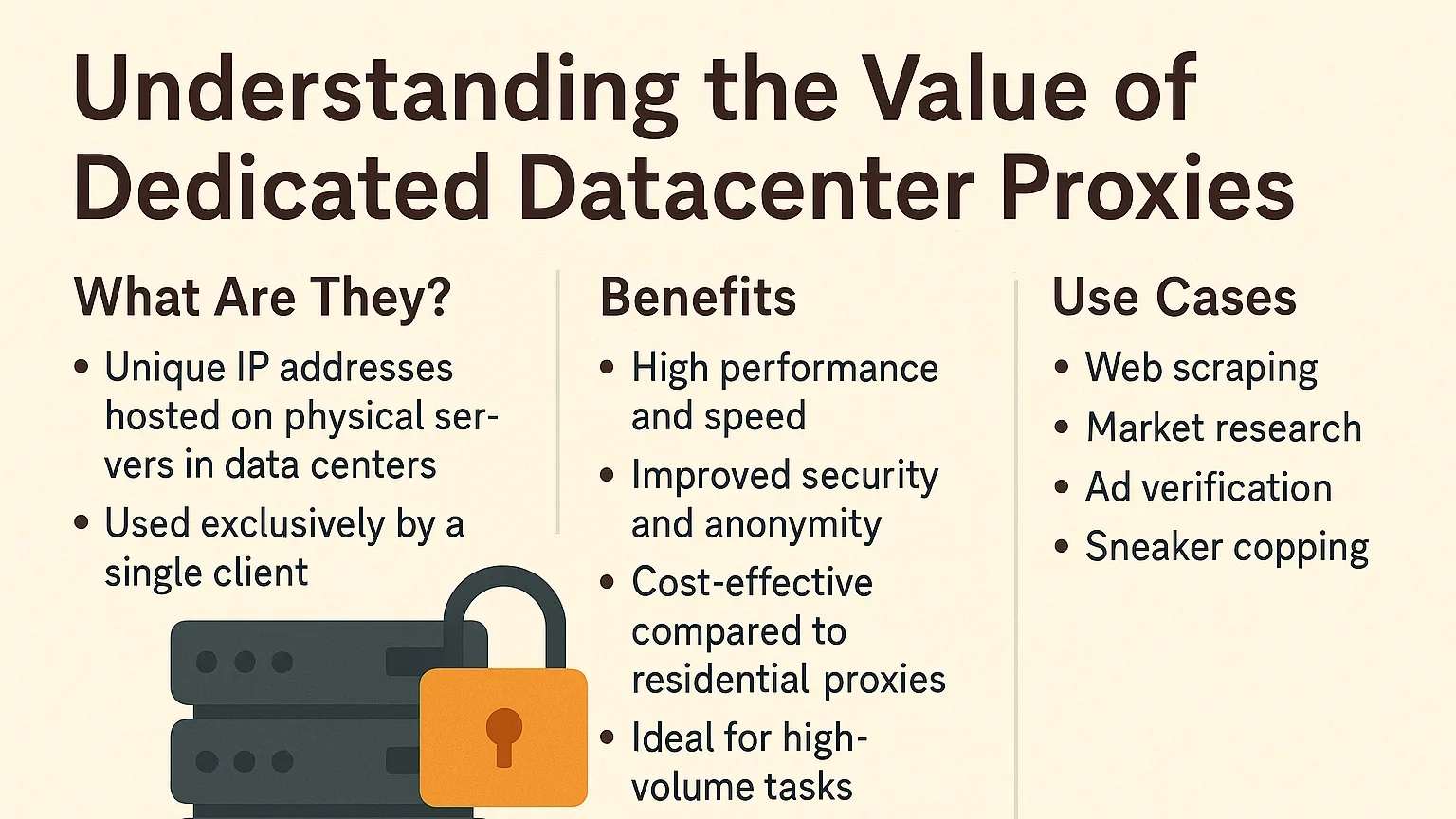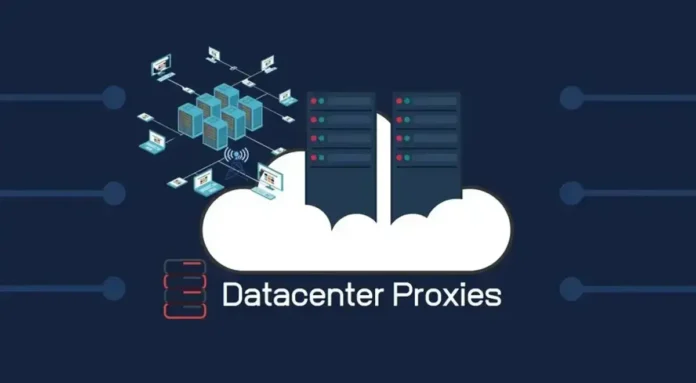In a digital economy where data is more critical than ever and automation drives innovation across industries, from e-commerce to AI, having the right tools to collect, protect, and scale data operations is no longer optional. It’s a core business necessity. Among these tools, dedicated datacenter proxies have emerged as a vital solution for organizations seeking performance, uptime, and control. However, in a diverse and often opaque proxy market, a fundamental question remains: how much should you pay to achieve the right balance between speed and stability?
Table of contents
Understanding the Value of Dedicated Datacenter Proxies

Unlike residential or mobile proxies, dedicated datacenter proxies consist of IPs sourced directly from datacenters and are not associated with consumer ISPs. This setup offers a competitive edge in performance, including high-speed connections, low latency, and ultra-reliable uptime. According to a 2023 Proxyway survey, 87% of businesses use these proxies for high-demand tasks such as large-scale web scraping, price intelligence, and real-time SEO monitoring.
Despite their speed advantages, datacenter proxies are more susceptible to detection and blocking. To combat this, leading proxy providers frequently enhance their services with features like geo-targeting, IP rotation, and browser emulation, which help reduce the risk of bans and broaden their application scope. For businesses evaluating costs, resources like Dedicated Datacenter Proxies Pricing can offer valuable insights into aligning proxy investments with operational goals.
Breaking Down the Price Points
As of late 2023 through 2024, dedicated datacenter proxies are generally priced in three tiers:
- $0.80 to $2.50 per IP/month: These are entry-level proxies, often with shared subnets and minimal additional features. Small operations typically use them with basic needs and limited risk exposure.
- $3 to $7 per IP/month: This mid-tier segment offers robust infrastructure, higher success rates, and features such as stealth integration. Businesses requiring accurate data and high uptime for operations like eCommerce intelligence or marketing analytics tend to rely on this tier.
- $5 to $10+ per IP/month for hybrid models: These proxies blend datacenter speed with ISP-like authenticity, making them ideal for high-stakes tasks that demand both speed and stealth, such as AI training and monitoring limited-release product markets.
At the enterprise level, providers often use custom pricing strategies based on performance metrics or API requests.
What Influences the Price?
Several factors influence datacenter proxy pricing. this is also where provider differentiation becomes obvious. While some suppliers focus on raw volume, others, such as ProxyCC, prioritize cleaner IP histories, more predictable subnet allocation and transparent usage policies. These factors directly affect pricing and long-term performance.
IP History and Reputation
Addresses with clean usage histories are less likely to be flagged and are therefore more valuable.
Location of Proxies
IPs based in high-demand regions like the U.S. or Europe tend to cost more due to superior infrastructure and regional demand.
Bandwidth Considerations
While some services promote “unlimited bandwidth,” high-tier providers often charge based on actual data use, especially for heavy-volume scrapers.
Package Features
Additional services such as CAPTCHA-solving, IP rotation, or browser fingerprinting increase costs but also improve reliability.
SLAs and Support
Providers that offer service-level agreements, custom uptime guarantees, or dedicated technical support are usually priced at a premium. In 2023, Oxylabs reported a growing shift among enterprise clients from residential to dedicated datacenter proxies, citing both better long-term operational costs and superior speed, particularly within QA and testing pipelines.
Trends Shaping the Proxy Market
| Trend | Quick Insight |
|---|---|
| Geo-Specific Demand | Surge in requests for proxies from regions like Japan, the US, and the EU. |
| Web Scraping Growth | Proxies power large-scale data collection tools. |
| Privacy Focus | Anonymity drives demand for secure proxy options. |
| Enterprise Use | Businesses need proxies for SEO, ads, and compliance. |
| Rotating Proxies Rise | Rotation tech helps avoid bans and detection. |
| Mobile Proxy Growth | Increasing use of localized app and ad testing. |
The global proxy market was valued at $1.25 billion in 2022 and continues to expand at a CAGR of 17.2%. Datacenter proxies represent approximately 35% of this market segment, and growth is accelerating.
Key trends driving this growth include:
- Rapid demand in AI and data science for web crawling and machine learning datasets.
- The emergence of success-based pricing models, where clients are charged based on performance rather than sheer volume.
- The rising popularity of hybrid proxies that combine performance with higher levels of reliability and anonymity.
- With businesses increasingly relying on real-time automation, premium proxy costs are projected to rise 8–12% annually from 2024 to at least 2026, especially in high-demand sectors such as cybersecurity, adtech, and competitive eCommerce intelligence.
Is the Investment Worth It?
When compared to residential alternatives, dedicated datacenter proxies offer a high return on investment. Businesses commonly report:
- 10x faster response speeds for tasks such as programmatic advertising or rapid data scraping
- Up to 60% savings over residential proxies when deployed across large-scale proxy pools or long-term data operations
- Superior scalability, with the ability to handle millions of daily queries without any service degradation
- Most organizations find that mid-range options, typically priced between $3 and $6 per IP/month, offer the ideal balance of performance, reliability, and cost-effectiveness for a wide variety of use cases.
Conclusion: Balancing Speed, Stability, and Budget
Selecting the proper proxy infrastructure is more than a technical choice; it’s a strategic business decision that directly affects automation capabilities, data accuracy, and workflow efficiency. While premium proxies offer significant benefits, most businesses don’t need the top-tier packages to see meaningful results.
Instead, focusing on a balanced proxy solution that offers both speed and reliability usually yields the best long-term value. As innovation continues, via stronger compliance tools, AI integration, and more sophisticated anti-detection features, the value of proxies will increasingly hinge on flexibility and operational transparency.
Understanding the drivers behind proxy pricing and aligning your investment with tangible business outcomes remains the cornerstone of a future-ready data strategy.











